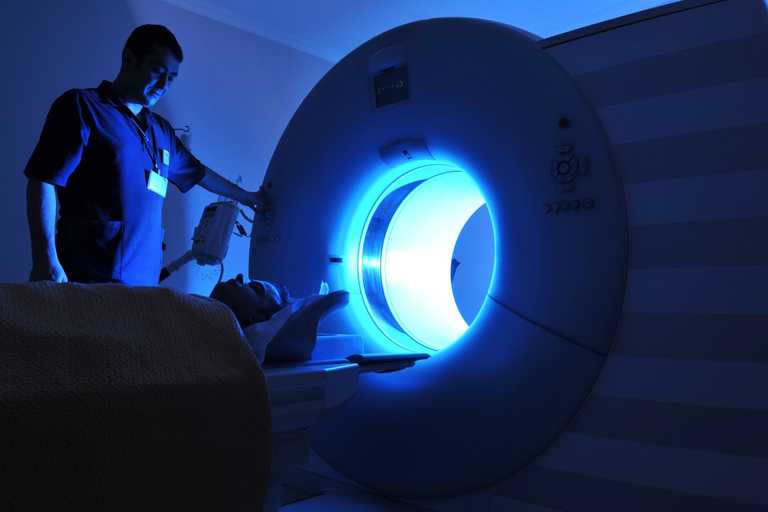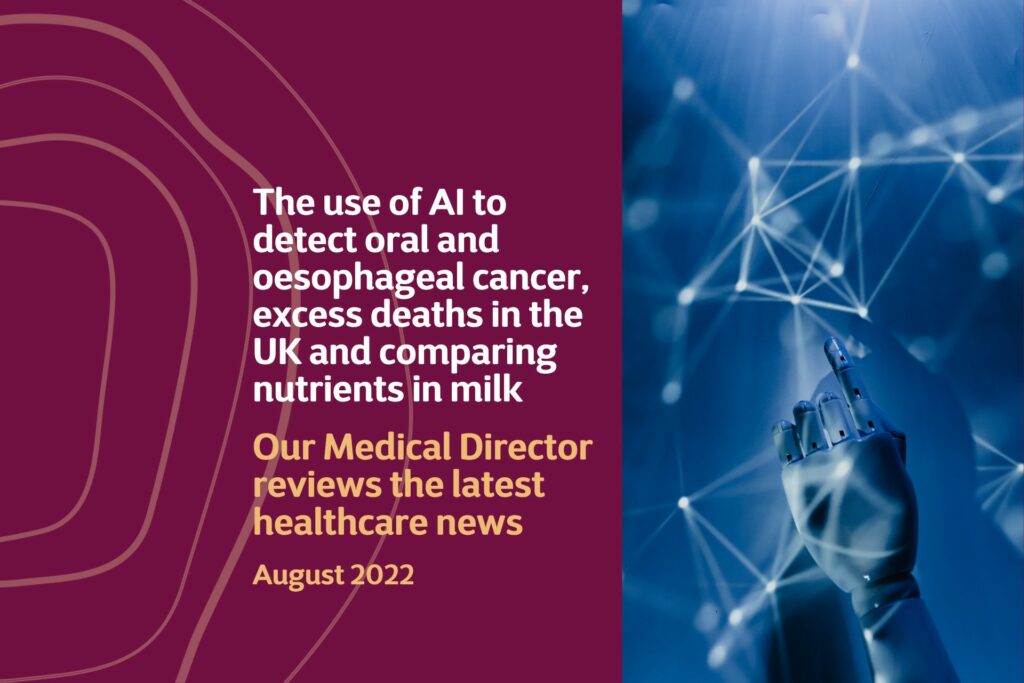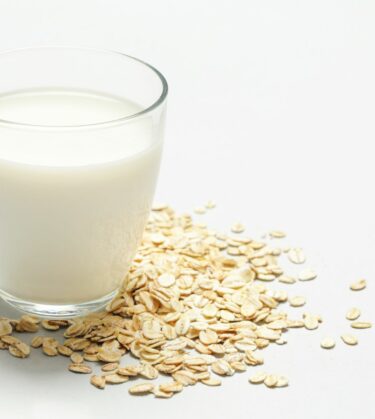Book A Private MRI Scan Without A Referral
If an injury is preventing you from fully enjoying life, you can now self refer and book an MRI scan at each of our centres, immediately. Same day appointments available.
Learn more

We kick off this month’s update with an article from the New Scientist about the detection of oral and oesophageal cancer.
Early detection is perhaps the most important aspect of improving cancer survival, but many oral, particularly oesophageal cancers present quite late and so have a relatively poor prognosis.
The five-year survival rates for oral cancer and oesophageal cancer are 68% and 21%. With early detection, these improve to mid-80% and nearly 50% for oesophageal cancer, a big improvement. Yet, with few or nondescript symptoms oral and oesophageal cancers are challenging.
The New Scientist reports on a AI tool that has been developed in the US. A team from the biotech company Viome, in New York studied just over a thousand patients who were over fifty or had a history of smoking (a risk factor for these cancers).
They took saliva samples and studied the genetic material of the bacteria and fungi in the samples. Their analysis included 92 patients with one of these cancers. They identified 88 unique changes in the genetic material of the bacteria in those with cancer compared to those without cancer. They then used the information to train an AI tool and tested it out on a further 230 samples. The results were very impressive – the tool accurately identified 90% of those with cancer.
The test received fast track support from the US drugs regulator and will soon be commercially available.
This is very encouraging, and it holds out the possibility of a tool for early identification. There’s more work to be done; the numbers in this study were relatively small, and it requires further study, BUT it is a big step forward in the early detection of some pretty bad news cancers.

Many of you may not have heard of RSV (respiratory syncytial virus) but if you have young children, you probably will. This month the New Scientist includes an article on the development of a vaccine for this winter bug which most children will have caught by the time they reach two.
For the majority, it’s a minor illness causing flu-like symptoms but for a minority, it causes severe inflammation of the smaller airways, the bronchioles and can lead to admission of paediatric intensive care and sadly, occasionally death.
Boston’s Children’s Hospital has been undertaking work to develop a vaccine for RSV. They used what is called the F protein from the RSV virus; this is similar to the spike protein in Covid; it’s the bit the virus uses to enter cells. Following on from successful mice studies the vaccine was tested successfully on a small number of new-borns, providing effective immunity.
The results were encouraging, and the team now need to do further work to test the vaccine on large numbers. This is another example of the progress we are now seeing in vaccine development.
As a GP I would regularly see many children through the winter months with RSV. Most were stable and didn’t need admission to hospital but every year I would see very poorly children; this vaccine would save lives.
The British Medical Journal (BMJ) reports that public health officials in the UK have detected a recent increase in death rates.
Figures collected by the Office for National Statistics have shown 10% more deaths than expected since April this year. This is 10% above the 5-year average.
It seems that the reason for these excess deaths is circulatory diseases and diabetes. Effectively these deaths will have been due to conditions such as heart attacks or strokes with heart disease and diabetes as the underlying factors. But why such an increase?
There’s no doubt that through and following Covid access to NHS care has been challenging and what we are seeing may be a knock-on effect from that.
The UK is pretty good on data recording so it’s important that we recognise this as a real effect. I suspect this will continue for some time and it’s a clear signal that we need to work harder to ensure that people with these conditions can access the care they need.

Sadly, chronic fatigue syndrome (CFS) is all too common and will often ‘stop’ people in their tracks. Fit individuals who were previously healthy will suddenly, after maybe just a minor viral illness, become severely fatigued. This can be so debilitating that individuals who had an active life can be almost confined to the four walls of their house.
The New Scientist reports on a study jointly undertaken between the University of Liverpool and Stellenbosch University in South Africa to explore one hypothesis that there may be a link between chronic fatigue and blood ‘micro clots’. Micro clots are small clumps of blood platelets, (the cells in the blood that help blood to clot) and have been seen in many inflammatory conditions such as diabetes, rheumatoid arthritis and Alzheimer’s disease.
The team analysed blood form 25 adults who had been diagnosed with CFS for at least the past six months and compared those samples with individuals without CFS who were living in the same area.
They studied many different aspects of blood clotting and counted the number of micro clots present in each of the samples on a scale of 1 to 4 with 1 being no clot to 4 being significant levels.
The results showed that 80% of the people with CFS scored a 2 or higher, with half a 3 or 4. All those without CFS scored 1.
These micro clots also appear in people with long covid however the severity in the CFS patients was less than in long covid but on an equal measure to the other inflammatory conditions such as rheumatoid arthritis.
The hypothesis is that such small clots block micro blood vessels and reduce blood flow to the tissues, thus leading to fatigue. It’s an important result and points the way for further exploration and hopefully the possibility of an effective treatment for fatigue.

A note of caution for those of you who prefer plant-based milk, such as almond or oat, to cow’s milk. The New Scientist reports on analysis undertaken by the US Food and Drug Administration (FDA) into the composition of these new sources of milk.
They analysed the amounts of four important nutrients – phosphorus, magnesium, zinc and selenium and compared the results to cow’s milk. The levels were all significantly lower than cow’s milk apart from open-based milk (not sure I’ve seen that one).
Plant milks are generally naturally lower in calcium and iodine, and the producers may add such elements to fortify the milk, but the levels of these other elements are not usually displayed on the labels.
Almond milk, for example, has about tenth of the phosphorus of cow’s milk. Phosphorus is needed for growth and tissue repair, as well as helping the body use substances such as vitamin D.
All of these nutrients can be obtained from other aspects of our diets such as nuts, but the important thing is to be aware and not to rely on plant-based milk for these nutrients. They taste good but we just need to have our eyes open about what nutrients they can provide for us.
That’s all for this month!
Please remember any views expressed in the blog are mine alone, and the information is not to be taken as medical advice.
If an injury is preventing you from fully enjoying life, you can now self refer and book an MRI scan at each of our centres, immediately. Same day appointments available.
Learn moreIf an injury is preventing you from fully enjoying life, you can now self refer and book an MRI scan at Prime Health Harley Street, immediately. Same day appointments available.
Learn moreIf an injury is preventing you from fully enjoying life, you can now self refer and book an MRI scan at Prime Health Manchester, immediately. Same day appointments available.
Learn moreIf an injury is preventing you from fully enjoying life, you can now self refer and book an MRI scan at Prime Health Surrey, immediately. Same day appointments available.
Learn more